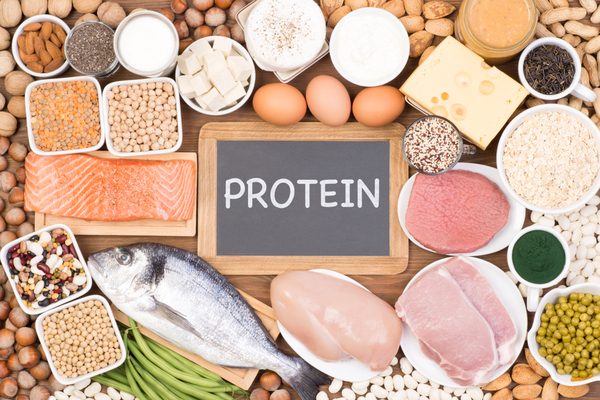They don’t call protein one of the building blocks of life for nothing. This macronutrient makes up the major component of all our cells and provides the essential amino acids that keep our bodies up and running. Problem is, some of us aren’t getting as much of it as we should be.
A true protein deficiency is very rare in the United States—though it can be seen in people who have anorexia, cancer, or, in the case of severe malnutrition, undiagnosed Crohn’s disease. But sometimes, vegans or people who follow a raw food diet could find themselves running a little low. “We have all these new plant-based foods in the marketplace, but [in terms of protein], they’re not all created equal,” explains Leslie Bonci, MPH, a nutritionist, owner of Active Eating Advice, and nutrition consultant for the Kansas City Chiefs. Take milk, for example: One cup of 1% cow’s milk contains about 8.5 grams of protein, while a cup of almond milk only contains just 1 gram.
Plus, most plant-based proteins aren’t complete proteins—meaning they’re short on at least one of the nine essential amino acids that can be found in animal foods like meat, seafood, and eggs. (Soy and quinoa are complete proteins; beans, peas, grains, nuts, and seeds are not, according to the Food and Drug Administration.) “I think that when people are opting for a plant-focused lifestyle, they have to make sure they aren’t short-changing themselves,” says Bonci.
The United States Department of Agriculture currently recommends that both men and women eat about .8 grams of protein for every kilogram of body weight, but Bonci says that if you’re strength training or exercising regularly—or are trying to preserve muscle while cutting calories—you may need a little more.(One pound is equal to 2.2 kilograms; so, an adult who weighs 150 pounds would need 54 grams of protein.) And there’s more to it than just meeting your macros. You should also be eating protein at the right time, too.”The body is most happy when it’s getting some protein every four to five hours,” says Bonci.
Here are five signs that you may not be getting as much protein as you should be.
You’re prone to stress fractures
Your bones need more than just a healthy dose of calcium—they also need enough protein, too.That was the conclusion from a 2018 research review from some of the world’s leading osteoporosis foundations, which found that eating a protein-rich diet can help protect your bones.
When we aren’t getting enough protein to fuel our organs and brain, our bodies borrow from other areas, including the storages in our skeletal muscle tissue, says Bonci. Without the support of strong skeletal muscle tissue, our bones are more susceptible to injures like fractures and breaks.
Your hair and nails look brittle
Because protein is an essential part of your hair and nails, your nails can feel softer and your hair can become more brittle over time, says Bonci. “The hair can lose some of its luster, and may not be quite as thick as it used to be,” she explains. “It may also start to split.”
After a few months of not eating enough protein, you may also experience some hair loss, according to the American Academy of Dermatology, in part because the body shuts down hair growth to preserve its protein stores.
You’re losing weight—from your muscles
The number on the scale may be ticking downward, but that’s not necessarily a good thing. “Typically, if people aren’t getting enough protein, their bodies will break down muscle to get more of it,” says Bonci. “And if they’re losing muscle, they’re also holding on to fat stores, so their body composition could be changing in an adverse way.”
You feel weak
You probably won’t feel fatigued right away, but over time, people who aren’t eating enough protein may feel more tired or sluggish than usual, says Bonci. Sure, less muscle mass can play a part in this, but Bonci adds that protein is a component of hemoglobin, which is present in our red blood cells and transports oxygen throughout the body. And too-low levels of oxygen could cause weakness or shortness of breath.
You’re always catching a cold
Protein is one of the building blocks of antibodies, which are produced by the body’s immune system to help fight off foreign invaders like bacteria and viruses, says Bonci. “If you don’t have enough protein, you could have a compromised immune system and perhaps be ill more often than other people,” she explains.
—
Photo Credit: photka / Shutterstock.com
